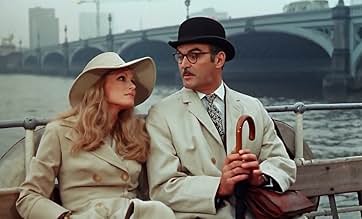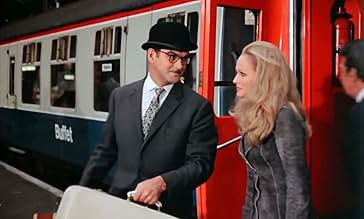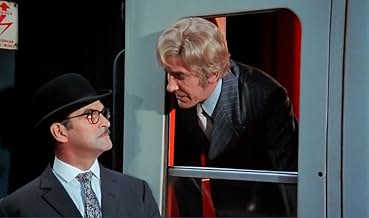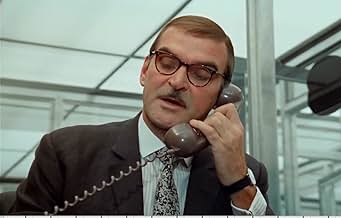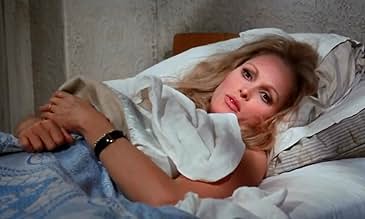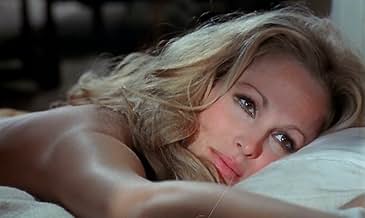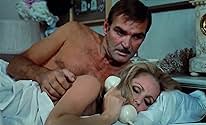Ajouter une intrigue dans votre langueThe deputy manager of a London bank has worked out a way to rob the branch of £200,000. When he becomes involved with the attractive Lady Dorset he decides to go ahead with his plan. He need... Tout lireThe deputy manager of a London bank has worked out a way to rob the branch of £200,000. When he becomes involved with the attractive Lady Dorset he decides to go ahead with his plan. He needs her help and that of her philandering spendthrift husband. It all comes down to a matter... Tout lireThe deputy manager of a London bank has worked out a way to rob the branch of £200,000. When he becomes involved with the attractive Lady Dorset he decides to go ahead with his plan. He needs her help and that of her philandering spendthrift husband. It all comes down to a matter of trust.
- Réalisation
- Scénario
- Casting principal
- Miss Marsh
- (as Anne Tirard)
Avis à la une
Peter Hall and Stanley Baker, director and star respectively, are in pot-boiler mode for this unassuming little British crime thriller. Made in the year that the swinging sixties ended and The Beatles split, the project retains a distinct whiff of 'groovy' hangover, but lacks the charm of (say) 'The Italian Job'.
Hall directs with trendy panache, crash-cutting between locations and playfully chopping the time sequence. The protracted 'wooing' of the two accomplices is told as two discrete stories spliced together by jump-cuts, with almost stream-of-consciousness linkage (Graham's tie is commented upon, so we move without explanation to the circumstances in whih he acquired it). Similarly, Graham meets Britt for a date in broad daylight on the lawn of the Wellington Monument, then the action jumps to Britt in a flamboyant orange negligee. Again, Britt 'unfreezes' from a still frame, frantically pulling off her clothes in the lobby of the new flat, and it is several minutes before this is explained, in a sequence which shows Britt's activities leading up to the freeze-frame.
Ursula Andress plays Britt, the frivolous babe, with a certain feline grace and a penchant for gentle comedy, but one cannot help suspecting that the part was written with Britt Ekland in mind. David Warner as Nick is suitably by turns languid and unruly, and dominates the vault inspection scene impressively, but ultimately fails to endear himself to the viewer. Baker's "Mr. Graham" somehow doesn't come off. He is too overtly macho to be convincing as a meek bank employee, and too sullen to engage our sympathy.
However, this is not a film which relies on overblown acting performances. The precise, almost mechanical directing reflects the immaculate planning of Graham's bank robbery. Just as the meticulous scheme is more important than the three pieces of human flotsam who execute it, so the artifice of film-making takes precedence over the performances.
The stifling routine of life in the National Metropolitan Bank is cleverly conveyed, with the managers partitioned like so many rabbits in their glass hutches. Into Graham's arid, stifled existence comes Britt, Lady Dorset, an exotic bird of paradise who dangles temptation before his jaded eyes. Graham's meeting with Nick is a chiaroscuro tour de force, the sombre patterns of bars and grilles ominously signalling the riskiness of the venture. When the three plotters finally meet face to face on the Thames pleasure cruiser, the psychological impact of the moment is cleverly underlined by the group's sudden emergence from the shadow of Westminster Bridge.
There has to be tension in bank job movies, and it is skilfully handled in this one. Graham hooks up a secret telephone handset in his office as Nick and Britt await the call which will activate the robbery. There is no incidental music, just the ticking of the couple's stopwatch and some background noises of office routine, and yet the sequence is totally gripping. The nervousness of Graham in the public call box is 'carried' to his accomplices in the nearby flat by means of a passing police siren, heard first by Graham and then by the others. The silence is electrifying as Graham helplessly awaits the outcome of the vault inspection.
Not all of the directorial tricks come off. Whether the bank manager's bowler hat and brolly are 'hommage' towards Alec Guinness in "The Lavender Hill Mob" or the clumsy, ritualistic anti-Establishment jibe so typical of the era, it just doesn't work. The reality is, bank managers did not dress like this, even in 1970, and whereas Guinness was a 'natural' in a bowler, Baker looks extremely uncomfortable.
Some of the camera techniques are questionable. The distracting zoom-in on each manager's namecard is obtrusive and unnecessary. The odd angles for the first dialogue between Graham and Britt are an echo of the 'fab' style current five years earlier, and they look wrong here. In fairness, though, the strange angles during the paper-and bank-notes switch may have some merit as a satirical comment on the worth of money. Cutting away from Graham's picnic to a passing jumbo jet (a sexy innovation in 1970) is supposed to encapsulate Graham's fantasies of escape, but it merely looks clumsy.
This film has its merits, and is intelligently executed on the whole, but ultimately it feels rather shallow and unsatisfying, an impression that is symbolised by the unconvincing 'surprise' ending.
Visually Baker's proper/classy role is to the tough guy actor what THE THOMAS CROWNE AFFAIR was to Steve McQueen, only his Mr. Graham has very little money,.. as does a quirky, perpetually-broke Warner in an almost sexless marriage to Andress, making for the usual "who'll backstab who?" criminal trio, common in this genre...
The ultimate problem is also what works through the first two acts as director Peter Hall provides a creatively choppy rhythm, allowing no superfluous moments since none of the conversations between the three members (always two at a time) lasts longer than needed to provide enough exposition to move the story forward...
But the idiosyncrasies eventually exhaust the heist-at-hand, making Andress's potential fatale, Baker's Henry Higgins-type and Warner's odd-man-out get lost in the director's frantic process, ultimately feeling more like an overlong (though nicely constructed) movie trailer than a sparse 90-minute caper.
David Warner's performance as Lord Dorset could stand as a classic reason why hereditary peers of the realm were phased out of seats in the House of Lords, especially when he dozes during a session in parliament. Dorset is supercilious, indolent and broke, but is married to a hot foreign body, Lady Brit (Ursula Andress).
Good as Stanley Baker and David Warner are, it's Ursula Andress who gives the film its sparkle. This is the kind of role that was made for her, a femme fatale with a touch of wit. Her voice was dubbed in some of her roles before this, including "Dr No", but her strong accent works well here.
According to Wikipedia she appeared nude or semi-nude in 9 of her 14 film roles between 1969 and 1979 - "Perfect Friday" is one of them - when she is on screen she upstages her two co-stars at every turn, and they hardly stand a chance against her in the bedroom.
It's also fascinating to see the world they inhabit - it's 1970 and there isn't a desktop computer or mobile phone in site. The caper they commit would probably be very difficult today with things like biometric security with fingerprint, iris and DNA scanners - not to mention vein recognition. These days Lord Dorset's disguise in "Perfect Friday" would fail from about the time he closed the door of his flat to head to the bank. But that's now, and the scam they pull off back then is clever and reasonably plausible.
If I have one reservation it would be the music. John Dankworth scored many films around the 60's and 70's, and for the most part they fitted like a glove - I particular liked his "Return from the Ashes". Unfortunately, he was a little over emphatic and obvious here. It's as though he thought it's a comedy so a touch of the circus should be about right. It would have benefited from something a little more understated.
However, it doesn't ruin the movie, and Stanley Baker was rightly proud of the finished work. As far as caper films are concerned, "Perfect Friday" is just about perfect.
Did I predict the ending correctly, no I didn't and I was sure that I was on the right track.
Great performances all round with Stanley, unusually, in a non tough guy role. An original plot, or original to me at least, which runs along very pleasantly with no bits that drag along.
The time passes quickly so it is an an enjoyable watch and not just because of Ursula's frequent habit of taking her clothes off.
Once again Stanley Baker plays a little man with big dreams and an enormous chip on his shoulder as a Deputy Under Manager in a bank in spectacles and a bowler hat; while David Warner does his supercilious bit as a jaded aristocrat who is of the opinion that "you can't understand what an ordeal it is to wear clothes made by a stranger!"
Neither seems particularly aware that the film is supposed to be a comedy, but Johnny Dankworth's fairground score makes sure we get the message.
Le saviez-vous
- AnecdotesStanley Baker and Ursula Andress' characters enjoy a picnic on the site of Wraysbury Reservoir which was in the process of being constructed to serve London. It was completed in 1970.
- Citations
Lord Nicholas "Nick" Dorset: What a dreadful tie.
Mr. Graham: A present from an admirer
[Dorset's wife]
Mr. Graham: .
- ConnexionsReferenced in Shaft, les nuits rouges de Harlem (1971)
Meilleurs choix
- How long is Perfect Friday?Alimenté par Alexa
Détails
- Date de sortie
- Pays d’origine
- Langue
- Aussi connu sous le nom de
- Perfect Friday
- Lieux de tournage
- Hyde Park Corner, Hyde Park, Westminster, Greater London, Angleterre, Royaume-Uni(Mr Graham waits for Lady Dorset in the park)
- Société de production
- Voir plus de crédits d'entreprise sur IMDbPro
Box-office
- Montant brut aux États-Unis et au Canada
- 502 198 $US
- Durée1 heure 34 minutes
- Couleur
- Rapport de forme
- 1.66 : 1
Contribuer à cette page



